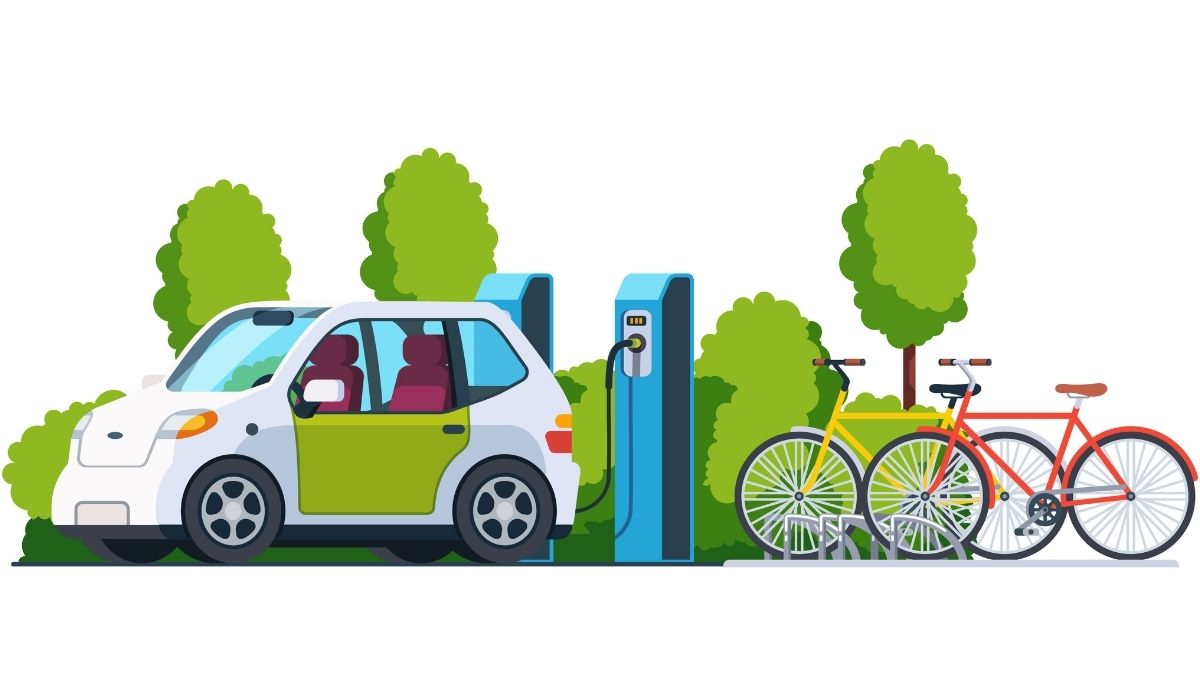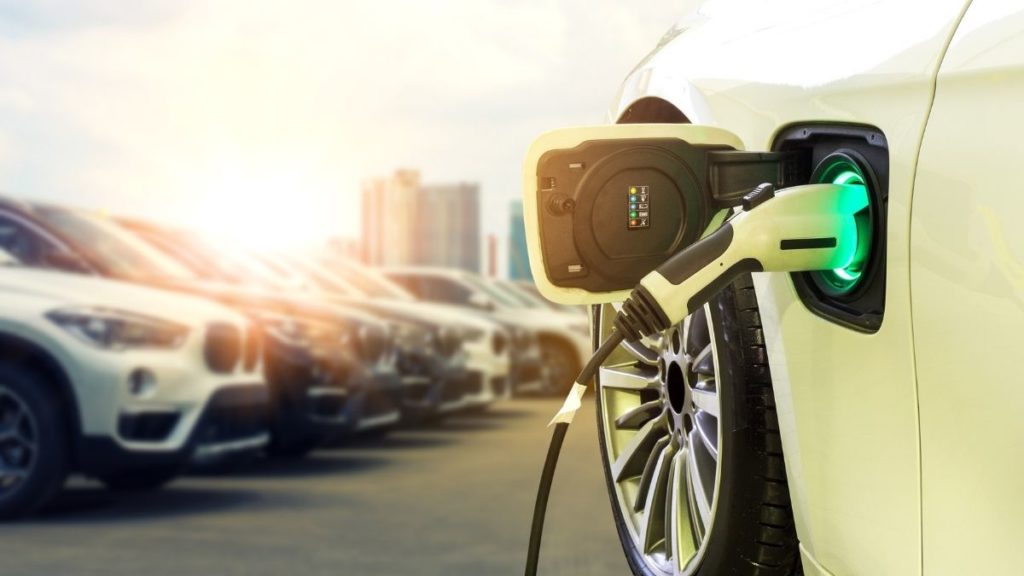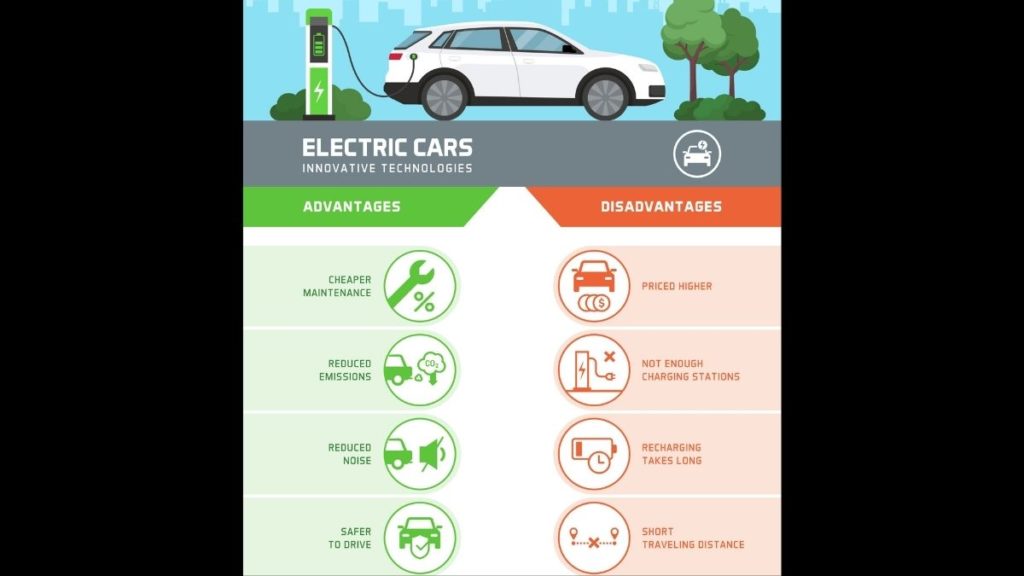
Electric cars have never been so much better and popular than they’re today. The number of EVs on roads is increasing and the technology is improving with each passing day. That’s why more people are keen to know about the pros and cons of electric cars.
As we are facing problems like air pollution and global warming, the widespread use of internal combustion cars is one of the major reasons behind it. Hence, the use of electric cars that are commonly known as green vehicles might improve the situation.
Anyway, let’s proceed with our topic of discussion.
Pros And Cons Of Electric Cars
There are multiple benefits and drawbacks of owning an electric car. First, let’s discuss the advantages of electric vehicles.

Benefits Of Electric Cars
1. Good for environment (Zero-Emissions)
Electric cars don’t have an IC engine and gasoline to run and thus don’t require an exhaust system. Electric cars have completely different powertrains that produce zero carbon emissions.
Due to this, there isn’t any fear of air pollution due to the harmful exhaust gases like in the case of gas vehicles. Electric cars are equipped with motors and batteries and require electricity to run which can be derived from renewable sources.
Hence, we can say that they are better for the environment and it’s the biggest reason why people are switching to electric vehicles.
2. Silent cars (Very little or no Noise Pollution)
You won’t notice an electric car cruising past until you see it with your eyes. EVs are known as silent vehicles due to their ability to produce very little or no sound.
Due to the absence of an internal combustion engine that has reciprocating pistons inside it, an exhaust system, and many other mechanical parts, there’s rarely any sound you will hear.
Some automakers like Tesla and Xpeng have also incorporated fake exhaust sound features into their electric cars in case some people feel the absence of it or just to make the vehicle more noticeable.
3. Cheap and Low Maintenance
In addition to the absence of an IC engine, other mechanical parts including flywheel, complex gearbox, propeller shaft, turbochargers, etc. are absent in electric cars.
Since lots of mechanical parts are not present it becomes obvious that maintenance work is reduced. Also, maintenance is required less frequently and it’s relatively cheaper than ICE cars.
4. Spacious (You get more cargo space)
In most electric cars, lithium-ion batteries are installed at the base or bottom of the passenger compartment.
This allows EV makers to add more cargo space to an electric car. For reference, in addition to the boot space, electric cars have cargo space under the bonnet as well.
5. Low running cost
According to a report, Americans pay an average of 15 cents per mile for driving IC engine cars. On the other hand, the running cost of EVs is found to be one-third of that of gas-powered cars.
Moreover, as EV technology is improving, soon there’ll be solar panels on the roof of electric vehicles. This will further reduce the overall running cost of electric cars.
6. You get tax credits and other incentives
In many countries across the globe, governments provide tax credits and other incentives to promote the adoption of EVs.
In the U.S., the government is offering a federal tax credit of up to $7,500 and if you are a resident of California then you get an additional $1,500.
This way EVs become more affordable for the masses.
7. Quick acceleration than gasoline cars
Electric cars have the ability to accelerate more quickly than ICE cars. Even the quickest accelerating cars are electric and not any gasoline cars.
Electric cars produce higher torque. In addition, this high torque can instantly be transferred to the wheels, giving it the ability to accelerate quicker than gasoline cars. Other than this, most electric cars have a single-speed transmission that can operate for a wide range of RPMs which further assist them in picking up fast. Altogether, these are some of the major factors that make EVs quick accelerating cars.
Disadvantages Of Electric Cars

1. Charging EVs Requires Time
Usually, an electric car requires around 10 hours to get fully charged using standard chargers at home. However, the best DC fast chargers can do the job in almost 60 to 90 mins.
On the other hand, you can refill a gasoline engine car in a matter of seconds. Also, you might have to pay to use DC fast chargers at stations.
2. Range Anxiety
Although cars like Tesla Model S and Model 3 have pretty long ranges, still other electric cars need to improve a lot.
The majority of electric cars have very short ranges and due to this, some people interested in long road trips hesitate to buy one. However, as technology is improving, the electric range of cars is also improving. Furthermore, new electric cars like Lucid Air with a better EV range are also on their way to foray into the market.
3. Underdeveloped Charging Infrastructure
Underdeveloped EV infrastructure is the biggest obstacle in the adoption of these green vehicles.
At present, except for a few developed nations, none of the countries have a proper charging infrastructure and network. In such a situation, what a person will do after buying an EV if that region doesn’t have a charging station.
Unless there is a proper EV infrastructure, there won’t be a successful adoption of electric vehicles.
4. Relatively Expensive
Although the running cost and maintenance of electric cars are low, they come with a higher price tag.
Well, in general, the starting range of electric cars in the U.S. is somewhere between $30,000 to $40,000 and the figure goes up to six digits for premium EVs.
Meanwhile, you can get a decent gasoline car for under $20,000. If we talk about the cheapest ones then you can get a brand new gas car for under $15,000, which is less than half of the price of an EV.
This difference in the price of an EV and a conventional car is mainly due to the presence of expensive lithium-ion batteries in electric cars. We hope as battery technology improves, their prices will finally drop and EVs will get more affordable.
4. Harmful Effects Of EV Battery Chemicals
As you are well aware, lithium-ion batteries are widely used in EVs. According to reports, the mining process of lithium is extremely dangerous and its leakage can cause serious effects. It can be deadly for aquatic animals if it gets mixed in the water bodies.
Anyway, if we talk about lithium-ion batteries, then, in addition to lithium it also comprises other metals like nickel and cobalt. Both of these metals can cause adverse effects on health if someone gets exposed to them.
Hence, it gets really important to keep high safety standards while manufacturing lithium batteries for electric cars.
What Are The Disadvantages Of Electric Cars On The Environment?
Indirectly, electric cars can produce serious amounts of greenhouse gases if coal was used to produce the electricity used for charging EVs.
In this case, the more electric vehicles the more pollution level will increase due to the coal.
However, if electricity is generated through renewable sources like water, solar plants, or windmills, then there’s no need to worry.
Anyway, these were some of the pros and cons of electric cars. We hope we have enlisted almost all the points regarding the topic. In case we forgot something, please remind us in the comments section below.
The post What Are The Pros And Cons Of Electric Cars? Explained appeared first on Fossbytes.
from Fossbytes https://ift.tt/3sBhi8O
via IFTTT

No comments:
Post a Comment